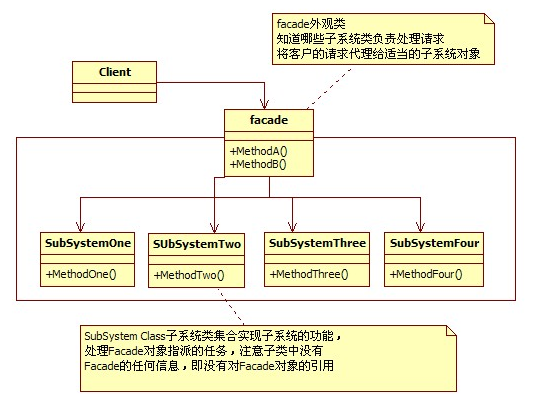外观模式:为子系统中的一组接口提供一个一致的界面,此模式定义了一个高层接口,这个接口使得这一子系统更加容易使用。

外观模式在什么时候使用呢?
分为三个阶段:
(1)首先,在设计初期阶段,应该要有意识的将不同的两个层分离。
(2)第二,在开发阶段,子系统往往因为不断的重构演化而变得越来越复杂,大多数的模式使用时也会产生很多很小的类,这本是好事儿,但是也给外部调用他们的用户程序带来了使用上的困难,增加外观Facade可以提供一个简单的接口,减少他们之间的依赖。
(3)第三,在维护一个遗留的大型系统时,可能这个系统已经非常难以维护和扩展了,但因为它包含非常重要的功能,新的需求开发必须要依赖于它。此时用外观模式Facade也是非常合适的。

1 #include<iostream> 2 #include<string> 3 4 class SubSystemOne{ 5 public: 6 void MethodOne(){ 7 std::cout << "SubSystemOne MethodOne " << std::endl; 8 } 9 }; 10 11 class SubSystemTwo{ 12 public: 13 void MethodTwo(){ 14 std::cout << "SubSystemTwo MethodTwo " << std::endl; 15 } 16 }; 17 18 class SubSystemThree{ 19 public: 20 void MethodThree(){ 21 std::cout << "SubSystemThree MethodThree " << std::endl; 22 } 23 }; 24 25 class SubSystemFour{ 26 public: 27 void MethodFour(){ 28 std::cout << "SubSystemFour MethodFour " << std::endl; 29 } 30 }; 31 32 33 class Facade{ 34 private: 35 SubSystemOne* one; 36 SubSystemTwo* two; 37 SubSystemThree* three; 38 SubSystemFour* four; 39 public: 40 Facade(){ 41 one = new SubSystemOne(); 42 two = new SubSystemTwo(); 43 three = new SubSystemThree(); 44 four = new SubSystemFour(); 45 46 } 47 ~Facade(){ 48 delete one; 49 delete two; 50 delete three; 51 delete four; 52 } 53 void MethodA(){ 54 std::cout << "MethodA-------" << std::endl; 55 one->MethodOne(); 56 two->MethodTwo(); 57 four->MethodFour(); 58 std::cout << std::endl; 59 } 60 void MethodB(){ 61 std::cout << "MethodB-------" << std::endl; 62 two->MethodTwo(); 63 three->MethodThree(); 64 std::cout << std::endl; 65 } 66 67 }; 68 69 70 71 72 73 //Client 74 void main() 75 { 76 Facade* facade = new Facade(); 77 78 facade->MethodA(); 79 facade->MethodB(); 80 81 delete facade; 82 83 system("pause"); 84 85 }